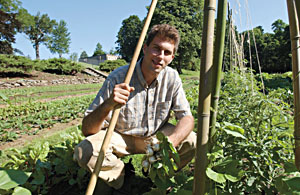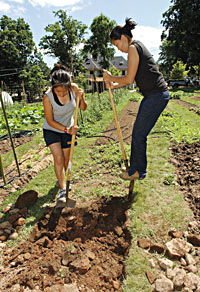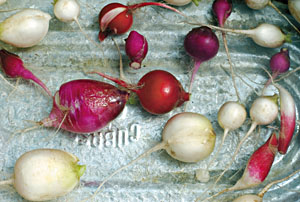 | Consultant Josh Viertel has worked with Yale College's Sustainable Food Initiative to set up a campus-wide composting system and to create the University's first organic garden in a corner of Farnam Gardens. |
People walking down the tree-lined block of Edwards Street between Whitney and Prospect streets will notice that an area the size of a football field, which had been an overgrown tangle of hemlocks and brush in May, is now a lush vegetable garden.
The garden, its neat rows overflowing with abundant and variegated crops separated by long turf paths, marks the newest phase of Yale College's Sustainable Food Initiative. The nine laborers industriously pushing wheelbarrows, planting seedlings and uprooting weeds are Yale students interning as organic farmers for the summer.
Yale's Sustainable Food Initiative promotes direct contact between consumers and growers, organic farming practices, composting to regenerate the earth and, most of all, respect for the process that brings food from the field to the table.
The drive to bring sustainable food practices to Yale has been gaining momentum since a student group, under the auspices of famed restaurateur Alice Waters, held a week-long festival of farming operations on the campus two years ago.
Since then, Berkeley College has hosted several organic banquets with "get-to-know-your-local-farmer" fairs, and last spring Berkeley College Master John Rogers, who has helped spearhead the Sustainable Food drive, pledged that Berkeley's dining hall would offer one wholly organic menu at every meal starting this fall.
With the full support of the administration, Yale Dining Services hired a consultant to explore setting up a campus-wide composting system, and a once-ignored corner of Farnam Gardens on Prospect
Street was cleared to make way for the University's first organic garden.
Every square foot of the garden has a story, which Viertel is happy to tell. The strawberries, for example, are a late-bearing variety that will produce fruit through the summer into the fall -- which, he says, is especially welcome after a rained-out spring. Garlic has been planted next to the strawberries because, Viertel explains, garlic repels insects and, although it seems counterintuitive, improves the flavor of the berries.
Not far from the strawberries and garlic, rows of crimson leaves sprout up. These purplish red leaves are a variety of amaranth which, Viertel explains, is a grain that was a staple of the Aztec diet. Like so many of the vegetables growing in the garden, amaranth is eminently versatile, he says: Its leaves are edible, and its beautiful flowers are perfect for cutting. It was also a major source of dye for the Hopi tribe, he adds.
Tucked close to the purple amaranth are some of its paler, greener relatives -- exemplifying another principle of sustainable farming: cultivating a diversity of species, Viertel notes. He points to other examples of garden variety vegetables supplanted by or sharing space with their uncommon relatives. A few rows away from a patch of common summer squash, grow several of its variants. These include the Middle Eastern "Magda," "Zephyr" and the curiously named "Benning's Green Tint Patty Pan." Though not yet matured, many other lesser-known types of the most prosaic vegetables may be found in these beds, among them a hot pink cauliflower named Graffiti, delicately flavored d'Avignon radishes, golden beets and three different varieties of arugula.
Passing a patch of shungiko, a Japanese chrysanthemum whose sweet leaves make excellent salad greens, Viertel pauses to check the progress of some broccoli rabe. Contrary to what its name suggests, he says, broccoli rabe is a closer kin of the turnip than it is of broccoli.
Whatever the biological advantages of cultivating diversity, the biggest benefit, Viertel argues, is actually the taste. Every variant of squash, for example has its unique flavor, he says, distinct both from its relatives and from the watery, bland variety found in supermarkets. Every type of squash has its unique flavor, he says, distinct both from its exotic relatives and from the watery, bland variety found in supermarkets.
Gardening is a system of checks and balances, Viertel contends. It is a folk art as much as a science, he adds, and its success depends on sharing experience -- with farmers learning from each other and handing down their knowledge through generations.
In this tradition, the Yale organic gardeners say they see their mission as educational and plan to use their experience to teach others. They're considering bringing some of their crops to a local farmer's market and they will share their bounty with the Berkeley College dining hall when the school term begins in September. Every odd-shaped pepper or strange variety of arugula they introduce to the market, Viertel says, will make consumers think about food -- and that essentially is what the Sustainable Food Initiative is all about, he adds.
When they hang up their hoes at the end of their first season, the Yale organic gardening team will celebrate their harvest with a grand banquet of the food they spent their summer growing, he says.
-- By Dorie Baker
T H I S
Yale students get lesson in organic farming

Like countless generations of farmers before them, Ivy Wang and Scarlet Kim struggle to break new ground in the garden.
Josh Viertel, the compost consultant who already has a pilot heap up and running, is an experienced organic farmer and a motivating force behind the creation of the garden.

The garden's crops include both rare offerings and lesser-known varieties of familiar vegetables, such as these d'Avignon radishes.
Viertel can cite the rationale for the positioning of everything growing in the field -- placing garlic next to strawberries being one example. Even the grass-covered paths that separate the beds have a purpose, he explains. Normally, the earth between rows of crops is tilled, perhaps lined with mulch. The Yale farming team chose grass, however, because it is an excellent source of nitrogen for the plants, it's more pleasant to walk on and, most importantly, it was already at the site, he says. The long aisles of grass are simply strips of sod that had been dug up to make way for the garden and were then replanted. The stakes propping up tomatoes, incidentally, are made from bamboo fortuitously discovered in an abandoned bamboo grove abutting the property.
 W E E K ' S
W E E K ' S S T O R I E S
S T O R I E S![]()
 The answer is: 'Jeopardy!'
The answer is: 'Jeopardy!'
![]()
![]()
 Yale students get lesson in organic farming
Yale students get lesson in organic farming![]()
![]()
 Gift to help create police station/community center
Gift to help create police station/community center
![]()
![]()
 Study: Environment plays role in some reading disabilities
Study: Environment plays role in some reading disabilities
![]()
![]()
 Works from Yale collection on view at the Met
Works from Yale collection on view at the Met
![]()
![]()
 Compounds being developed to treat infectious disease
Compounds being developed to treat infectious disease
![]()
![]()
 IN FOCUS: Community Rowing Program
IN FOCUS: Community Rowing Program
![]()
![]()
 MEDICAL SCHOOL NEWS
MEDICAL SCHOOL NEWS Discovery reveals new way to monitor body temperature
Discovery reveals new way to monitor body temperature
![]()
 Researcher develops test to determine if womb . . .
Researcher develops test to determine if womb . . .
![]()
 Study: Diabetics often prescribed unsafe heart medications
Study: Diabetics often prescribed unsafe heart medications
![]()
 Diuretics may boost treatment success in cocaine addicts
Diuretics may boost treatment success in cocaine addicts
![]()
![]()
 Beinecke Library to celebrate women in the arts
Beinecke Library to celebrate women in the arts![]()
![]()
 Pilot Pen tournament features tennis and much more
Pilot Pen tournament features tennis and much more![]()
![]()
 Meg Bellinger joins Yale staff as associate librarian
Meg Bellinger joins Yale staff as associate librarian![]()
![]()
 Dr. Robert Donaldson, former medical deputy dean, dies
Dr. Robert Donaldson, former medical deputy dean, dies![]()
![]()
 Recent graduates win honors in international design competition
Recent graduates win honors in international design competition![]()
![]()
 Mystery, humor, tragedy -- Yale Rep's new season has them all
Mystery, humor, tragedy -- Yale Rep's new season has them all![]()
![]()
 Three journalists will enhance their legal reporting as Knight Fellows
Three journalists will enhance their legal reporting as Knight Fellows
![]()
![]()
 Globalization's impact on health, gender explored
Globalization's impact on health, gender explored![]()
![]()
 Welcome to the future
Welcome to the future![]()
![]()
 Search Committee Named for Beinecke Library Director
Search Committee Named for Beinecke Library Director![]()
![]()
 YUWO scholarships to help 11 Yale affiliates further their education
YUWO scholarships to help 11 Yale affiliates further their education![]()
![]()
 Campus Notes
Campus Notes![]()
Bulletin Home |
| Visiting on Campus
Visiting on Campus |
| Calendar of Events
Calendar of Events |
| In the News
In the News![]()
Bulletin Board |
| Classified Ads
Classified Ads |
| Search Archives
Search Archives |
| Deadlines
Deadlines![]()
Bulletin Staff |
| Public Affairs
Public Affairs |
| News Releases
News Releases |
| E-Mail Us
E-Mail Us |
| Yale Home
Yale Home